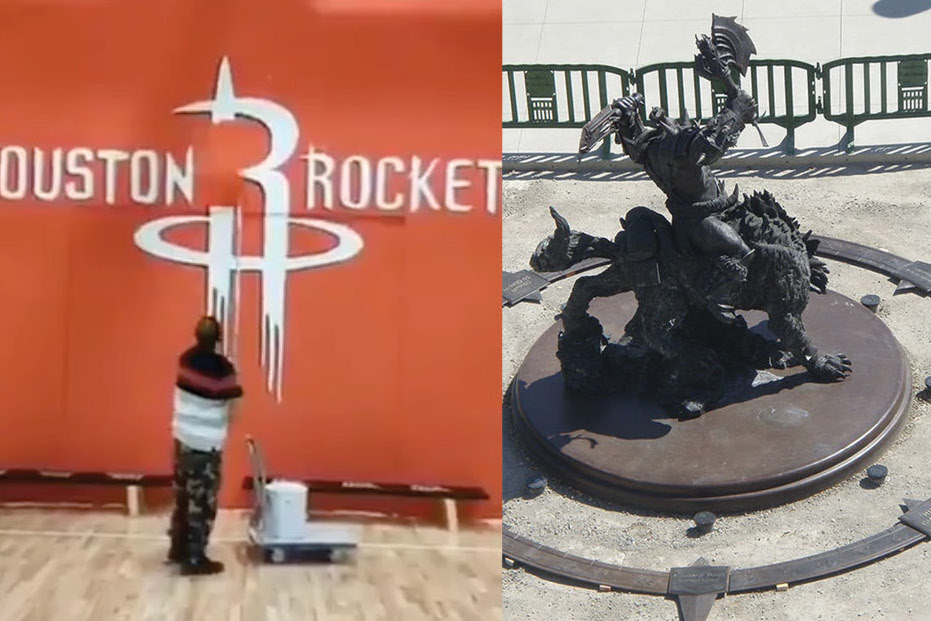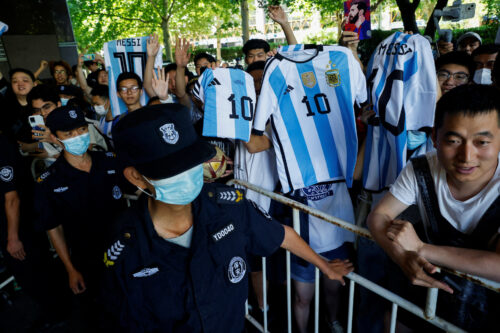China has played itself

By attacking the NBA, China exposed the more unsavory aspects of its authoritarian ways to a wider segment of the American mainstream. Now gamers are mad, too.

China has gone and done it. First it pissed off American sports fans, and then it crossed gamers — two groups whose people are loud, uncompromising, and passionate, among the most active on social media, excitable when it comes to their pastimes, and least likely to tolerate bullshit. They’re now aligned around the cause of free speech, with China fingered as the world’s biggest threat. This can’t be what Beijing was expecting when its minions launched a thousand ships seeking retribution for one little tweet.
That tweet, of course, was Houston Rockets General Manager Daryl Morey’s, who on Friday expressed support for the Hong Kong protests. China “overplayed its hand” in its response, my colleague Lucas Niewenhuis wrote on Monday — and now all I can think is how it might overplay its hand after the latest: On Sunday, Hearthstone player Chung Ng Wai (a.k.a., “Blitzchung”), in a post-match interview, declared, “Liberate Hong Kong, revolution of our time.” The incident blew up on Tuesday when Blizzard Entertainment, which makes Hearthstone, suspended Blitzchung for a year, citing damages to the company’s image. But it was soon obvious that Blizzard only damaged itself, as it now faces disgruntled employees and calls for its boycott from users around the world. (Here’s an example of the popular sentiment.)
In the interest of fairness, “China” did not, as far as we know, force Blizzard’s hand. But the gaming company has a partnership with the Chinese publisher NetEase, and 5 percent of its parent company, Activision, belongs to Tencent. Considering the events from the past couple of days, Blizzard surely sensed the brainless dead congregating at its Twitter gates. If you’ll recall: After Morey’s tweet last Friday, Chinese bots swarmed his Twitter account, businesses pulled their money from the Rockets, and then brands ditched the entire league; the Chinese consulate in Houston expressed its “strong dissatisfaction,” and Chinese state TV and Tencent, the NBA’s digital streaming partner, suspended broadcasts. At an NBA exhibit in Beijing, organizers removed all Rockets references — including Chinese legend Yáo Míng 姚明, who had a Hall of Fame career in Houston — and on some random basketball court in Shanghai, the Houston Rockets logo was painted over:
Houston Rockets artwork on an indoor basketball court in Shanghai being painted over. We live in sad times. pic.twitter.com/RR6owruj3N
— Cameron Wilson 韦侃仑 (@CameronWEF) October 8, 2019
All because of a tweet from an individual account. If that symphony of whingeing wasn’t exactly orchestrated by the Chinese Communist Party, it was performed with its imprimatur and with the CCP contributing a few bars on their mini violins. The People’s Daily — the party’s mouthpiece — published this poll on Tuesday, with four choices that are…not choices:
https://twitter.com/gerryshih/status/1181806123877195778
This is just what China does, and has been doing since it found its feet after the global financial crisis. It flexes on those who show the tiniest dependence on its succor and then flogs them — Marriott, Cathay Pacific, MUJI, Versace (et al.), Swarovski, Mercedes-Benz, Gap, etc. — at the slightest slip-up.
Typically, these standoffs are briskly resolved and quietly forgotten, usually after full acquiescence accompanied by a timorous apology from the condemned, since no one really has the stomach for a protracted discussion over, say, the “non-offensive” way to refer to the French Concession (click on that MUJI link for a good eye-roll). Thing is, while businesses have customers eager to fork over money, the NBA has fanbases that are, by definition, fanatic. China overstepped, and now a previously non-China-watching audience is asking, “Why exactly is ESPN sending memos forbidding discussion of Chinese politics?” along with questions about the Hong Kong government’s aggressive suppression of demonstrations and Beijing’s oppression of Uyghurs and other Muslim minorities.
Sports fans, who are naturals when it comes to assembling (precisely the thing that has Beijing so angry at Hong Kong), have long found small but impactful ways to be heard. Recently in France, Lyon supporters angry at their club for accommodating Chinese viewers held colored cards in the design of the Tibetan flag. Last night, the Hearthstone team at American University held up a “Free Hong Kong, Boycott Blizz” banner. And two days ago, a GoFundMe page was created to raise money for “Stand with Hong Kong” t-shirts to be worn by attendees of the NBA’s opening night game in Los Angeles, when the Lakers take on the Clippers on national television; more than $43,000 has been pledged so far. (Perhaps the Boston Celtics’ Enes Kanter, who is Muslim and has waged a personal battle against the Turkish government, will want one.)
Alas, there is a vicious cycle that awaits: one contingent will do what it does, wield speech in order to provoke a reaction (China only has itself to blame: it basically told the world how to trigger it), while the other contingent will do what it does, which is bunker down and forcefully object to any outside interrogation of issues it adjudicates “nonnegotiable.” From one side, there’ll be noise from voices normally absent on China hashtags, including U.S. Senators; the other side will interpret this as yet another coordinated effort from “the West” to undermine its authority. Common ground will shrink. Moderates will be shouted down. Fundamental incompatibilities will crystallize. China watchers will sigh, knowing death comes to us all. No one will be wiser.
This is our reality in the age of the Aggrieved Authoritarian. Around the time Xi Jinping took power, our very own Kaiser Kuo used the term “new truculence” to describe Beijing’s strategy of defending itself against foreign attacks and addressing grievances, whether real or perceived. When truculence meets hypersensitivity, what you get is the triple threat of online harassment, damages to business, and outright censorship. (For an example of that last item, here’s what happened to South Park for daring to be funny.) Those who are sympathetic to China, who see its conduct as a justifiable byproduct of the unjust treatment it has endured in the past, will point out that this is just the cost of doing business with a country trying to reclaim a respectful place on the global hierarchy. Fair enough, but is society not allowed to mull over the cost, honestly and publicly? China has redlines, they’ve made that clear, but why are foreign institutions punished for considering the question even amongst themselves?
And as for China, where does it stop? When all of the NBA’s official Chinese partners have already severed ties, what leverage does Beijing have left to force the league to prostrate itself further? Beijing faces a conundrum of its own making: How hard does it truly want its businesses and media mouthpieces to push, after all, knowing that the immediate consequence is that its citizens will be deprived of a product they actually enjoy? In all of these discussions, we seem to have forgotten that Chinese people like basketball, and like the NBA. They like Blizzard’s products, not just Hearthstone, but StarCraft and other games (the country basically saved the Warcraft movie). You can bet Chinese fans will find unauthorized streams of NBA games, if it comes down to it. People denied access to these products might eventually begin to ask uncomfortable questions, such as: Is all this hubbub over a tweet worth it?
Whatever that answer, in the immediate future, the hubbub will continue. Because America is now acquainted with China’s antics, you can expect the best and brightest from the sports and gaming worlds to deliver snark, satire, and scorn. (The Onion is already on it.) Much of it will be good. Some of it will be stale. None of it will inspire China to nudge closer to the international community. But all of it just might be worthwhile anyway, as a reminder that some values shouldn’t have a price. We’ll see if the NBA and Blizzard agree.







